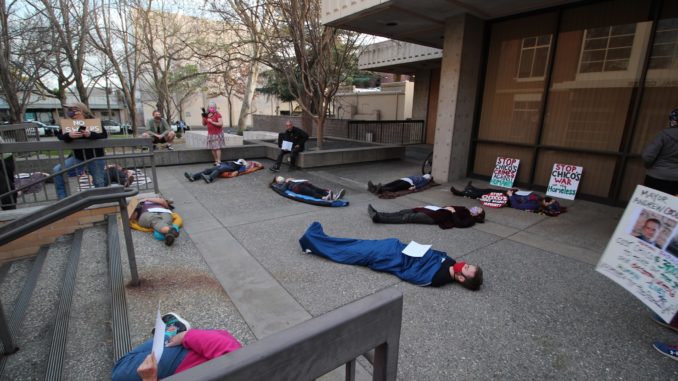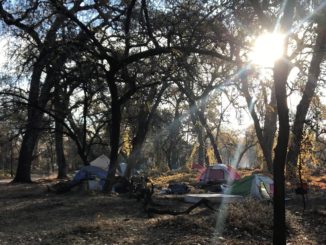
We were heartened by the turnout outside of the City Council chambers last Tuesday (March 2), where dozens of Chicoans gathered to remember their homeless neighbors.
They were there to mourn those who’d perished—at least 18 people over the past eight months—and bring attention to these deaths. Tragically, several of the departed died alone literally on the streets.
The demonstration reminded us that there are many people in Chico who care deeply about those who are less fortunate.
Sadly, kind folks often get overshadowed by the hateful rhetoric of the armchair authoritarians who use their keyboards to rile up outrage in the community. We’re referring to the people who are concerned not with the struggles of those living without shelter but rather with how such poverty is an eyesore.
In their echo chamber, they have emboldened each other, speaking as though they have more right to the public square. They refer to homeless individuals as criminals and activists as enablers. One of them had the audacity to suggest that citizen’s arrests were warranted for helpers, a call to action Butte County’s district attorney and Chico’s police chief shot down, the latter issuing a statement noting that wannabe cops could be subject to both civil liability and criminal charges.
We’re tired of their endless vilification, but the greater concern is the action being carried out by order of local elected leaders. The City Council’s grand plan to address homelessness is giving street and park dwellers notices to vacate one site only to reissue them to the same people elsewhere at a later date. It’s an exercise in futility. It’s also quite cruel.
Members of the council and city management like to weave a narrative about Chico’s great capacity for compassion, but those words ring hollow. There is nothing even remotely humane about a policy wherein the destitute are booted from public spaces without being offered an alternative.
Such tactics are hard on the body and the soul. But that’s the point, isn’t it?
The current council is intent on inflicting misery on human beings with the hope that they’ll have enough and move along indefinitely. That or perhaps die.
Frankly, we are ashamed of our beloved town. We are mortified that the council has chosen to meet this moment with a concerted effort to double down on human suffering.
Thankfully, we also have a strong activist community to help individuals and bring attention to their plight.
That’s what we saw last week, when citizens laid down on the cold concrete in front of the City Council chambers during a “die-in” demonstration in remembrance of the aforementioned individuals who passed away. It was simultaneously a cry for mercy for those on the streets, as well as a call for the council to do something to abate the humanitarian crisis in our midst.
Chico has a long and storied tradition of civil disobedience, and we’re happy to see newcomers join longtime activists in what we see as the most critical cause in modern local history. We have no doubt that their efforts are justified and righteous. Conversely, we have no doubt that, should the city continue its current course of action, the names of those in the council majority—Andrew Coolidge, Kami Denlay, Sean Morgan, Kasey Reynolds and Deepika Tandon—will be remembered for this shameful, ill-conceived policy.
Of course, that protest was just the latest act of solidarity in the activist community to stand up for local unhoused residents. Behind the scenes, good people have been quietly volunteering in a multitude of capacities—providing food and supplies needed for every life, as well as words of comfort and encouragement. We thank them for being on the right side of history.




Thank you so your coverage of the Chico city council’s stand on our unhoused people. I have lived in Chico for 42 years and have never been so ashamed of our community as I am now. The mayor’s statement of rousting camps until the unhoused “just go back where they came from “ seems to reflect the majority of the council’s sentiment. We can and we must find a mutually beneficial solution to this problem as so many other cities and towns have already implemented.